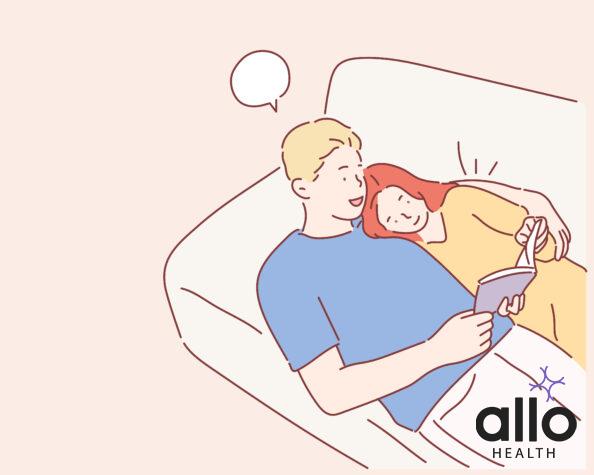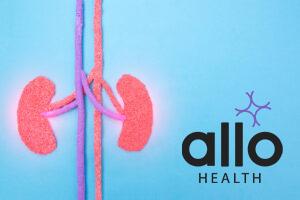Why Does It Hurt to Pee After Sex? Exploring the Causes and Treatments

Allo Health is dedicated to personalized well-being, offering support and trusted information tailored to individual health goals. The platform emphasizes human-generated content, led by a distinguished medical team of experts, including physicians and sexual health specialists. Their commitment to credibility involves rigorous fact-checking, authoritative research, and continuous updates to ensure accurate, up-to-date information. Allo Health's unique approach goes beyond conventional platforms, providing expert-led insights and a continuous commitment to excellence, with user feedback playing a crucial role in shaping the platform's authoritative voice.

A psychologist with clinical specialization and experience working with sub-clinical and clinical populations. Her areas of interest and expertise include anxiety-related disorders, mood disorders, psychotic disorders, addictions, sexual health and wellness, relationship issues, stress, and geriatric mental health.
Why This Was Upated?
Our experts continually monitor the health and wellness space, and we update our articles when new information became available.
Updated on 15 June, 2024
- Article was updated as part of our commitment to diversity, equity, and inclusion.

"The following blog article may discuss medical treatments and interventions. However, it is important to note that the information provided is for general educational purposes only and should not be considered as a substitute for professional medical advice, diagnosis, or treatment. Always seek the guidance of a qualified healthcare professional for personalized medical advice.
Book consultation
Medical treatments are complex and should be tailored to individual circumstances. The information presented in this blog may not be applicable to everyone, as each person's medical condition, history, and needs are unique. Only a qualified healthcare professional can evaluate your specific medical situation, consider relevant factors, and provide appropriate recommendations for diagnosis, treatment options, and monitoring.
It is crucial to note that self-diagnosis, self-medication, or relying solely on the information provided in this blog for treatment decisions can have serious health consequences. "
Sex is an enjoyable and intimate bonding experience, but sometimes it can lead to discomfort, pain, and even health concerns, such as urinary tract infections (UTIs). If you experience pain or discomfort while peeing after sex, it is important to understand the possible causes and treatments for this condition to avoid any long-term and severe health concerns.
Understanding the Anatomy of the Urinary Tract
Before diving into the causes and treatments, let’s take a quick look at the anatomy of the urinary tract, which plays a crucial role in urination and sexual activities.
The urinary tract consists of various organs, including the kidneys, ureters, bladder, urethra, and prostate gland (in males).
During sex, the urinary tract can be exposed to bacteria and other harmful substances that can lead to infection, pain, and discomfort while peeing.
The urinary tract is not just responsible for eliminating waste from the body, but also plays a vital role in regulating blood pressure and maintaining proper electrolyte balance. The kidneys, in particular, filter waste and excess fluids from the blood, while also producing hormones that help regulate blood pressure and red blood cell production.
Understanding the complexity and importance of the urinary tract can help individuals take better care of their overall health and seek medical attention when necessary.
Sex and Urinary Tract Infections (UTIs):
UTIs are the most common cause of painful peeing after sex. They occur when bacteria enter the urinary tract and multiply, causing inflammation and pain.
Women are more prone to UTIs than men due to their shorter urethra, which makes it easier for bacteria to reach the bladder and cause an infection.
Sex can increase the risk of UTIs by pushing bacteria into the urethra and pushing urine out, which can prevent bacterial growth.
However, not all sexual activities carry the same risk of UTIs. For example, using a condom during sex can reduce the risk of UTIs by preventing the spread of bacteria.
Additionally, urinating before and after sex can help flush out any bacteria that may have entered the urethra during sexual activity. It’s also important to maintain good hygiene practices, such as wiping from front to back after using the bathroom, to prevent the spread of bacteria from the anus to the urethra.
How Does Bacteria Enter the Urinary Tract During Sex?

During sex, the urethra can be exposed to bacteria from the anus or genital area of either partner. This can happen during vaginal sex, anal sex, or any sexual activity that involves skin-to-skin contact in the genital area.
Women are more likely to develop UTIs after sex because the urethra is close to the vagina and anus, which makes it more vulnerable to bacterial exposure. Men can also develop UTIs after sex, especially if they have unprotected anal sex.
If left untreated, UTIs can lead to more serious health concerns such as kidney infections. Symptoms of a UTI include a strong urge to urinate, a burning sensation during urination, cloudy or strong-smelling urine, and pelvic pain. If you experience any of these symptoms, it is important to see a healthcare provider for proper diagnosis and treatment.
Symptoms of UTI
The symptoms of UTIs can vary and can include:
- Painful urination
- Frequent urination
- A strong urge to urinate
- Cloudy or strong-smelling urine
- Pelvic pain or discomfort.
Some people may also experience if the UTI has spread to the kidneys:
- Fever
- Chills
- Nausea
If you experience any of these symptoms, it is important to see a doctor for proper diagnosis and treatment.
UTIs are more common in women than in men, and certain factors can increase the risk of developing a UTI, such as sexual activity, the use of certain types of birth control, and menopause.
Additionally, some people may be more prone to UTIs due to underlying medical conditions, such as diabetes or a weakened immune system. Taking steps to prevent UTIs, such as staying hydrated and practicing good hygiene, can help reduce the risk of developing this uncomfortable and sometimes painful condition.
Why Painful Urination After Sex is a Common UTI Symptom
Painful urination is a common symptom of UTIs caused by the inflammation of the urethra and bladder. During sex, bacteria can enter the urethra and cause an infection in the bladder or other parts of the urinary system, leading to pain and discomfort while peeing. The pain can vary from mild to severe and may also cause a burning or itching sensation.
Not all cases of painful urination after sex are caused by UTIs. Other possible causes include sexually transmitted infections (STIs), vaginal dryness, and irritation from certain products such as spermicides or lubricants. It is important to see a healthcare provider to determine the underlying cause and receive appropriate treatment.
Preventative measures can also be taken to reduce the risk of developing UTIs. These include urinating before and after sex, drinking plenty of water, and practicing good hygiene. It is also important to use condoms during sexual activity to reduce the risk of STIs.
Other Possible Causes of Painful Urination After Sex

Painful urination after sex can also occur due to other causes, such as vulvodynia, which is a chronic pain condition that affects the vulva’s external genitalia. This condition can lead to pain, itching, and discomfort during sex and urination.
Another possible cause is a sexually transmitted infection (STI), such as herpes or chlamydia, which can cause painful urination and other symptoms.
It is important to see a doctor to determine the underlying cause of the painful urination and get appropriate treatment.
Tips for Preventing UTIs During and After Sex
There are several ways to reduce the risk of UTIs during and after sex, such as:
- Urinating before and after sex
- Practicing good hygiene
- Using a barrier method of birth control (such as condoms)
- Avoiding irritating substances, such as harsh soaps or douches.
- Drinking plenty of water
- Avoiding sugary drinks can also help flush out bacteria from the urinary tract.
In addition to these preventative measures, certain sexual positions may also increase the risk of UTIs. Positions that put pressure on the bladder or allow bacteria to enter the urethra can increase the likelihood of infection. Experimenting with different positions and finding what works best for you and your partner can help reduce the risk of UTIs during sex.
When to See a Doctor About Painful Urination After Sex
If you experience painful urination after sex, it is important to see a doctor to determine the underlying cause and get appropriate treatment. UTIs can lead to severe complications if left untreated, such as kidney damage or even sepsis. If the pain is severe or accompanied by other symptoms, such as fever or nausea, seek medical attention immediately.
There are several possible causes of painful urination after sex, including sexually transmitted infections (STIs) such as chlamydia or gonorrhea. These infections can also lead to serious health concerns if left untreated, such as pelvic inflammatory disease (PID) or infertility. It is important to get tested for STIs and receive appropriate treatment if necessary.
Additionally, practicing safe sex can help prevent painful urination after sex. Using condoms or other barrier methods can reduce the risk of infection and inflammation in the urinary tract. It is also important to stay hydrated and urinate after sex to flush out any bacteria that may have entered the urinary tract.
Diagnosis: How Doctors Test for UTIs and Other Conditions

To diagnose UTIs and other infections that can cause painful urination, a doctor may perform a physical exam and ask about your symptoms and medical history. They may also collect a urine sample for analysis to look for signs of infection or other abnormalities. Depending on the suspected cause, your doctor may also order additional tests, such as a pelvic exam, blood test, or imaging test.
Treatment Options for UTIs and Painful Urination After Sex
The treatment for UTIs and painful urination after sex depends on the underlying cause and severity of the condition. UTIs are usually treated with antibiotics, which help kill the bacteria causing the infection. Pain medication may also be prescribed to reduce discomfort and inflammation. In some cases, hospitalization may be necessary if the infection is severe or has spread to other parts of the body.
It is important to note that antibiotics should only be taken as prescribed by a healthcare professional. Overuse or misuse of antibiotics can lead to antibiotic resistance, making it harder to treat infections in the future. Additionally, there are natural remedies that may help alleviate symptoms of UTIs and painful urination after sex, such as drinking cranberry juice or taking probiotics.
Prevention is also key in avoiding UTIs and painful urination after sex. This can include practicing good hygiene, urinating before and after sexual activity, and using condoms to reduce the risk of sexually transmitted infections. It is important to talk to a healthcare professional about any concerns or symptoms, as they can provide personalized treatment and advice.
How Antibiotics Work to Treat UTIs and Other Infections
Antibiotics are medications that are designed to kill bacteria and stop the infection. They work by targeting specific components of the bacteria, such as the cell wall or protein synthesis pathways, and preventing them from dividing or reproducing.
Take antibiotics exactly as prescribed and for the full course of treatment to ensure that all the bacteria have been eliminated.
However, antibiotics only work against bacterial infections and are not effective against viral infections, such as the common cold or flu. In fact, overuse and misuse of antibiotics can lead to antibiotic resistance, where bacteria become resistant to the drugs and are harder to treat in the future.
Additionally, while antibiotics are effective in treating infections, they can also have side effects.
Common side effects include:
- Nausea
- Diarrhea
- Allergic reactions
Discuss any concerns or side effects with your healthcare provider and to only take antibiotics when necessary.
Lifestyle Changes to Help Prevent Future UTIs and Painful Peeing After Sex
To prevent future UTIs and painful peeing after sex, there are several lifestyle changes you can make, such as practicing good hygiene, urinating before and after sex, maintaining a healthy diet and exercise routine, and avoiding tight-fitting clothing.
It is also important to communicate with your sexual partner about their sexual health and use barrier methods of birth control to reduce the risk of infection.
Final Words:
Painful peeing after sex can be a sign of a UTI or other health condition that requires medical attention.
If you experience any pain or discomfort while urinating after sex, it is important to see a doctor for proper diagnosis and treatment.
By understanding the causes and treatments of this condition, you can stay healthy and enjoy a satisfying sex life without any discomfort or pain.
Taking probiotics can help maintain a healthy balance of bacteria in the urinary tract, reducing the risk of infection.
Frequently Asked Questions
Q: Why does it hurt to pee after sex?
A: Painful urination after sex can be caused by various factors, including urinary tract infections (UTIs), irritation of the urethra, or inflammation of the bladder.
Q: Can frequent urination after sex be a major concern?
A: Frequent urination after sex can be a concern and may indicate a urinary tract infection (UTI) or other underlying issues. Seeking medical attention is important to diagnose and address any potential problems promptly.
Q: What are some reasons, besides UTI, that can cause pain while urinating?
A: Pain while urinating can be caused by conditions like sexually transmitted infections (STIs), kidney stones, vaginal infections, or irritation of the urethra. Additionally, individuals with a latex allergy may experience discomfort or irritation if exposed to latex during sexual activity, leading to pain during urination.







































